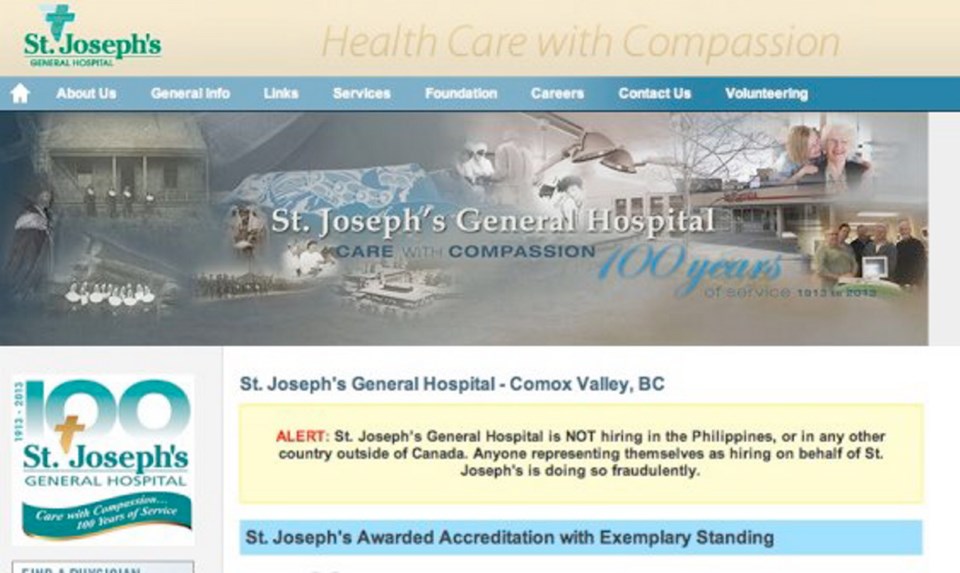St. Joseph's General Hospital was deployed as bait by Philippines-based scam artists trying to lure prospective temporary foreign workers into handing over hard earned cash, with promises of health care jobs at the Comox facility.
At least one out of about 10 people who contacted the Catholic care facility actually paid the equivalent of about $100 Cdn to a company claiming to be seeking registered nurse and care aides.
"Here we are in the relatively sleepy Comox Valley and who would have thought this is going on in another part of the world?" said Gillian Henderson, director of human resources at St. Joseph's, whose name was used in the pitch to unsuspecting Filipinos. "Now they just target a hospital and away they go."
The scam was discovered in early March as the hospital received about 10 calls and emails from potential workers eager to find out just how likely it would be for them to score one of the prized positions at the facility.
Officials say they only have one temporary foreign worker in the entire complex, since there is more than enough supply in the Canadian labour market to fill positions on site. In that case the hospital had worked hand in hand with Human Resources Canada to fill the position.
"It took us a bit by surprise," Henderson said. "We put the warning on our website in case anyone went on to check."
In addition the hospital contacted the Health Employers Association of B.C. and Providence Health Care, in case other Catholic care organizations were being targeted specifically. It also provided information to the Filipino consul in Vancouver and put a warning directly on its own home page to alert anyone else who was trying to figure out the validity of the employment opportunity.
In speaking with the woman who had actually been scammed out of about $100 Henderson realized just how in depth the fraudulent activity actually was.
"It was elaborate," she said, explaining that detailed information had been lifted from the legitimate St. Joseph's website and transformed into documentation which was used to convince prospective workers to attend a career orientation program. "She couldn't believe she was taken in by this."
Multiple dates were given for event attendance at an urban location in the Philippines. Attendees were told to dress in business casual.
Henderson wonders if the goal of the criminals was to extract personal identification from workers for further fraud later on. She doesn't even want to think about the possibility that actual human trafficking was planned.
"We can't directly stop it either," she said, noting it's out of the RCMP's jurisdiction. "It just shows you how smart people are about taking people in."
Henderson said she felt powerless knowing that her own identity was being used to steal money from people.
"There's so little I can do about it," she said. "You do feel a bit like it speaks to your integrity and yet it doesn't."
At the same time she identifies with the victims, since she herself came over to Canada form Great Britain and first got work under the permanent resident program.
"I could sort of relate to that whole experience in a way," she said, pointing out just how tempting a scam like this would seem. "It's not easy to get into Canada."
St. Joseph's expects the scam artists have moved on to the next target, as they haven't heard any more about the fraudulent activity in recent days.



